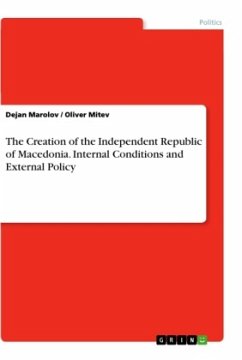Bachelor Thesis from the year 2015 in the subject Politics - Region: Southeastern Europe, grade: 1,3, University of Passau (Chair for International Politics), language: English, abstract: Ultimately, the question "Which factors have been favoring and obstructing power sharing in Bosnia and Macedonia?" will be answered in this thesis. The first part will offer the theoretical framework following Arend Lijphart's Favorable Conditions for Consociational Democracy, which has been subject of constant readjustment over the course of his different studies on consociationalism. Following a brief introduction on the theory of consociationalism, the nine favorable factors of power sharing by Lijphart will be explained in greater detail. External actors will be added as an additional factor up for review. Criticism of Lijphart's factors will conclude the first part of the thesis. The main part of the thesis is concerned with the actual case studies of Bosnia and Macedonia. The theoretical model will be applied to the countries realities, by dedicating a chapter to each factor. Each chapter will end with a short conclusion on whether the factor can be considered favorable in the respective countries, while also including a brief comparison between Bosnia and Macedonia.Moreover, the conclusion will draw a comparison of the effects of the favorable factors in Bosnia and Macedonia and therefore help assessing the relevance of Lijphart's favorable factors in general.
Hinweis: Dieser Artikel kann nur an eine deutsche Lieferadresse ausgeliefert werden.
Hinweis: Dieser Artikel kann nur an eine deutsche Lieferadresse ausgeliefert werden.








